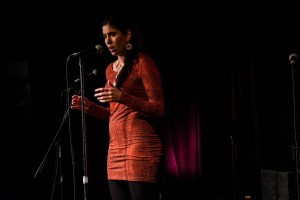“Slam poetry offers the ability for a performer to connect with his/her audience in a deeper way, and allows the performer to articulate a set of emotions and thoughts succinctly using the power of voice and words. It’s also a platform that goes beyond creative expression. Just like any art form, slam poetry and spoken word allow the artist to talk about social issues and social change.” -Mehroz Baig, Butler-Koshland Fellow, The Commonwealth Club, Huffington Post
As the Mi’kmaq poet Rebecca Thomas performs a powerful spoken word narrative about the experiences of marginalization shared by Canada’s indigenous peoples (as seen in this video), she is also performing a “soft weapon” (Whitlock p.3). Defined by Gillian Whitlock as a way to “personalize and and humanize categories of people whose experiences are frequently unseen and unheard” (3), Thomas takes it one step further by putting a face to those ” frequently unseen” and a voice to those “unheard”.
The poem linked above was delivered by Thomas during a national spoken word competition in Victoria last week, where she went after earning a spot on Nova Scotia’s provincial team. In her piece, “What Am I Supposed To Think?”, she describes an insightful and highly personal account of her experiences with racism as a member of the Mi’kmaq Nation. While also briefly mentioning her father’s experiences in residential schools, Thomas explores the term “second generation testimony” which Schaffer and Smith present in their 2004 article Conjunction: Life narratives in the Field of Human Rights (9). While Shaffer and Smith discuss “trauma as self-alerting and self-shattering” (7), Thomas gives multiple historical examples of social, political and racial injustices faced by First Nations people:
- Ignorant internet comments “…when the hate is spelt out perfectly in internet ink, calling us punks and drunks…”
- Bold political opinions while referring to Prime Minister Stephen Harper as a “sinister prime minister”,
- Limited and biased media coverage from a First Nations perspective with “but that’s not what’s seen splashed across your TV screen
In the face of this type of discrimination, Thomas finds a way to highlight some beautiful aspects of her Mi’kmaq culture. To emphasize the importance of strength and community she explains: “we are the Wabanaki, people of the dawn, new beginning, fresh start, healing heart, it’s just a down to the spirit bruise, but haven’t you seen the news? We are resilient.”
The discrimination that Rebecca talks about in her poem, is still prevalent in Canadian society today. As discussed by Professor Susanne Gessner in a lecture for her Anthropology 212 at the University of British Columbia, some First Nations children that attend school with an accent known as “First Nations English” are commonly referred to speech therapy by their teachers to have their accents “corrected”. Professor Gessner also added that this seems surprising since children from Australia, England, Japan, or any other country resulting in a different accent from the standard North American would not. This may seem like a small detail, but shows how discrimination against First Nations is prevalent in many levels of Canadian society.
The issue of discrimination toward the First Nations community is still at play in Canada, regardless of how progressive we seem as a multicultural nation. In the midst of all the negativity over the past several centuries, Rebecca Thomas still finds a way to stay positive in this 3 minute, 10 second video. She spreads words of wisdom and hope with “we are the “Wobanaki”, people of the dawn, new beginning, fresh start, healing heart, it’s just a down to the spirit bruise, but haven’t you seen the news? We are resilient.”
Citations:
Baig, Mehroz. “Slam Poetry: A History.” The Huffington Post. TheHuffingtonPost.com, 14 Mar. 2014. Web. 17 Oct. 2014. <http://www.huffingtonpost.com/mehroz-baig/slam-poetry-a-history_b_4944799.html>.
Fenton, Andre. “Rebecca Thomas – What Am I Supposed to Think?” YouTube. YouTube, 18 Oct. 2014. Web. 20 Oct. 2014. <https://www.youtube.com/watch?v=1BX0xCn8Hgw>.
Schaffer, Kay, and Sidonie Smith. “Conjunctions: Life Narratives In The Field Of Human Rights.” Biography (2004): 1-24. Print.
Whitlock, Gillian. “Introduction: Word Made Flesh.” Soft Weapons: Autobiography in Transit. Chicago: U of Chicago, 2007. Print.
